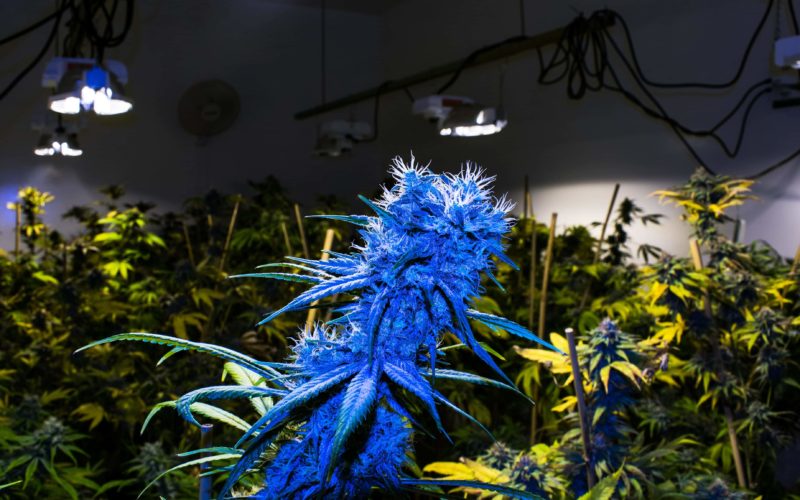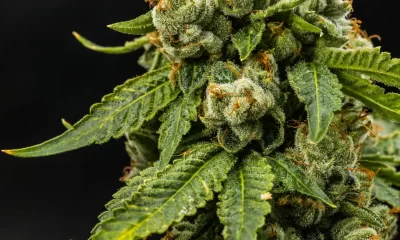Business
New Jersey Cannabis: Almost $80 Million Sold in First 10 Weeks

New Jersey’s recently launched legal cannabis market has racked up nearly $80 million worth of sales in the first ten weeks following its launch in late April.
The state’s Cannabis Regulatory Commission released the sales figures in a report last week. Between April 21, when sales launched in the Garden State, and the end of June, tax revenue from recreational pot totaled $4,649,202. There was $79,698,831 in total sales on recreational cannabis during that same time frame.
Jeff Brown, the executive director of the New Jersey Cannabis Regulatory Commission, said that the numbers indicate a healthy market with room for growth.
“The market is improving. It is performing as we expect with the current number of dispensaries, the spread of locations, and the high prices,” Brown said in a statement on Friday. “As more cannabis businesses come online, consumers won’t have to travel as far to make purchases, and prices will fall with increased competition. The market will do even better.”
Dianna Houenou, the chair of the state Cannabis Regulatory Commission, echoed Brown’s optimism.
“New Jerseyans are looking forward to supporting new businesses – which will increase sales figures and generate more revenue to be reinvested in our communities,” Houenou said. “We are working to make that happen. We are issuing awards to start new businesses on their path to operation and look forward to the industry growth we see coming in the near future.”
After a long, oft-delayed rollout, New Jersey’s recreational cannabis market finally opened for business on April 21. Thousands of customers showed up for the grand opening, generating nearly $1.9 million worth of recreational pot sales on the first day.
“We expected sales to be substantial and the data shows that the market is effectively serving both adult-use consumers and patients,” Brown said in a statement at the time. “We continue to monitor inventory and access for patients and are prepared to take enforcement action against any [medical cannabis dispensary] that does not meet the requirements for patient access and supply.”
Voters in New Jersey approved a ballot measure in 2020 that legalized recreational pot use for adults aged 21 and older. The state legalized medical cannabis a decade prior.
In its report issued last week, the Cannabis Regulatory Commission said that medical cannabis sales in New Jersey “ticked up to $59,262,014” after suffering “a small decline to $55,838,072 in the first quarter of 2022.”
The $59.2 million figure, the commission said, “is more in line with sales figures the last quarter of 2021.”
“The demand for medicinal cannabis continues to be strong and we are committed to ensuring access for patients,” Brown said.
Although recreational pot sales have been strong in New Jersey, the road to launch was anything but smooth.
Adult-use sales were initially supposed to begin in February, but the state missed the deadline, prompting Nicholas Scutari, the president of the New Jersey state Senate, to call for hearings that looked into the reasons behind the delays.
“These delays are totally unacceptable,” Scutari said in a statement at the time. “We need to get the legal marijuana market up and running in New Jersey. This has become a failure to follow through on the public mandate and to meet the expectations for new businesses and consumers.”
In May, Brown testified at a hearing called by Scutari that lasted five hours.
Scutari said at the proceeding that his public pressure may have been the impetus for the market to launch the month prior.
“I’m confident that if we did not start this process, the adult weed market would still not be open in New Jersey,” Scutari said at the hearing.
Source: https://hightimes.com/news/new-jersey-cannabis-almost-80-million-sold-in-first-10-weeks/
Business
New Mexico cannabis operator fined, loses license for alleged BioTrack fraud

New Mexico regulators fined a cannabis operator nearly $300,000 and revoked its license after the company allegedly created fake reports in the state’s traceability software.
The New Mexico Cannabis Control Division (CCD) accused marijuana manufacturer and retailer Golden Roots of 11 violations, according to Albuquerque Business First.
Golden Roots operates the The Cannabis Revolution Dispensary.
The majority of the violations are related to the Albuquerque company’s improper use of BioTrack, which has been New Mexico’s track-and-trace vendor since 2015.
The CCD alleges Golden Roots reported marijuana production only two months after it had received its vertically integrated license, according to Albuquerque Business First.
Because cannabis takes longer than two months to be cultivated, the CCD was suspicious of the report.
After inspecting the company’s premises, the CCD alleged Golden Roots reported cultivation, transportation and sales in BioTrack but wasn’t able to provide officers who inspected the site evidence that the operator was cultivating cannabis.
In April, the CCD revoked Golden Roots’ license and issued a $10,000 fine, according to the news outlet.
The company requested a hearing, which the regulator scheduled for Sept. 1.
At the hearing, the CCD testified that the company’s dried-cannabis weights in BioTrack were suspicious because they didn’t seem to accurately reflect how much weight marijuana loses as it dries.
Company employees also poorly accounted for why they were making adjustments in the system of up to 24 pounds of cannabis, making comments such as “bad” or “mistake” in the software, Albuquerque Business First reported.
Golden Roots was fined $298,972.05 – the amount regulators allege the company made selling products that weren’t properly accounted for in BioTrack.
The CCD has been cracking down on cannabis operators accused of selling products procured from out-of-state or not grown legally:
- Regulators alleged in August that Albuquerque dispensary Sawmill Sweet Leaf sold out-of-state products and didn’t have a license for extraction.
- Paradise Exotics Distro lost its license in July after regulators alleged the company sold products made in California.
Golden Roots was the first alleged rulebreaker in New Mexico to be asked to pay a large fine.
Source: https://mjbizdaily.com/new-mexico-cannabis-operator-fined-loses-license-for-alleged-biotrack-fraud/
Business
Marijuana companies suing US attorney general in federal prohibition challenge

Four marijuana companies, including a multistate operator, have filed a lawsuit against U.S. Attorney General Merrick Garland in which they allege the federal MJ prohibition under the Controlled Substances Act is no longer constitutional.
According to the complaint, filed Thursday in U.S. District Court in Massachusetts, retailer Canna Provisions, Treevit delivery service CEO Gyasi Sellers, cultivator Wiseacre Farm and MSO Verano Holdings Corp. are all harmed by “the federal government’s unconstitutional ban on cultivating, manufacturing, distributing, or possessing intrastate marijuana.”
Verano is headquartered in Chicago but has operations in Massachusetts; the other three operators are based in Massachusetts.
The lawsuit seeks a ruling that the “Controlled Substances Act is unconstitutional as applied to the intrastate cultivation, manufacture, possession, and distribution of marijuana pursuant to state law.”
The companies want the case to go before the U.S. Supreme Court.
They hired prominent law firm Boies Schiller Flexner to represent them.
The New York-based firm’s principal is David Boies, whose former clients include Microsoft, former presidential candidate Al Gore and Elizabeth Holmes’ disgraced startup Theranos.
Similar challenges to the federal Controlled Substances Act (CSA) have failed.
One such challenge led to a landmark Supreme Court decision in 2005.
In Gonzalez vs. Raich, the highest court in the United States ruled in a 6-3 decision that the commerce clause of the U.S. Constitution gave Congress the power to outlaw marijuana federally, even though state laws allow the cultivation and sale of cannabis.
In the 18 years since that ruling, 23 states and the District of Columbia have legalized adult-use marijuana and the federal government has allowed a multibillion-dollar cannabis industry to thrive.
Since both Congress and the U.S. Department of Justice, currently headed by Garland, have declined to intervene in state-licensed marijuana markets, the key facts that led to the Supreme Court’s 2005 ruling “no longer apply,” Boies said in a statement Thursday.
“The Supreme Court has since made clear that the federal government lacks the authority to regulate purely intrastate commerce,” Boies said.
“Moreover, the facts on which those precedents are based are no longer true.”
Verano President Darren Weiss said in a statement the company is “prepared to bring this case all the way to the Supreme Court in order to align federal law with how Congress has acted for years.”
While the Biden administration’s push to reschedule marijuana would help solve marijuana operators’ federal tax woes, neither rescheduling nor modest Congressional reforms such as the SAFER Banking Act “solve the fundamental issue,” Weiss added.
“The application of the CSA to lawful state-run cannabis business is an unconstitutional overreach on state sovereignty that has led to decades of harm, failed businesses, lost jobs, and unsafe working conditions.”
Business
Alabama to make another attempt Dec. 1 to award medical cannabis licenses

Alabama regulators are targeting Dec. 1 to award the first batch of medical cannabis business licenses after the agency’s first two attempts were scrapped because of scoring errors and litigation.
The first licenses will be awarded to individual cultivators, delivery providers, processors, dispensaries and state testing labs, according to the Alabama Medical Cannabis Commission (AMCC).
Then, on Dec. 12, the AMCC will award licenses for vertically integrated operations, a designation set primarily for multistate operators.
Licenses are expected to be handed out 28 days after they have been awarded, so MMJ production could begin in early January, according to the Alabama Daily News.
That means MMJ products could be available for patients around early March, an AMCC spokesperson told the media outlet.
Regulators initially awarded 21 business licenses in June, only to void them after applicants alleged inconsistencies with how the applications were scored.
Then, in August, the state awarded 24 different licenses – 19 went to June recipients – only to reverse themselves again and scratch those licenses after spurned applicants filed lawsuits.
A state judge dismissed a lawsuit filed by Chicago-based MSO Verano Holdings Corp., but another lawsuit is pending.
Source: https://mjbizdaily.com/alabama-plans-to-award-medical-cannabis-licenses-dec-1/
-

 Business2 years ago
Business2 years agoPot Odor Does Not Justify Probable Cause for Vehicle Searches, Minnesota Court Affirms
-

 Business2 years ago
Business2 years agoNew Mexico cannabis operator fined, loses license for alleged BioTrack fraud
-

 Business2 years ago
Business2 years agoAlabama to make another attempt Dec. 1 to award medical cannabis licenses
-

 Business2 years ago
Business2 years agoWashington State Pays Out $9.4 Million in Refunds Relating to Drug Convictions
-

 Business2 years ago
Business2 years agoMarijuana companies suing US attorney general in federal prohibition challenge
-

 Business2 years ago
Business2 years agoLegal Marijuana Handed A Nothing Burger From NY State
-

 Business2 years ago
Business2 years agoCan Cannabis Help Seasonal Depression
-

 Blogs2 years ago
Blogs2 years agoCannabis Art Is Flourishing On Etsy













